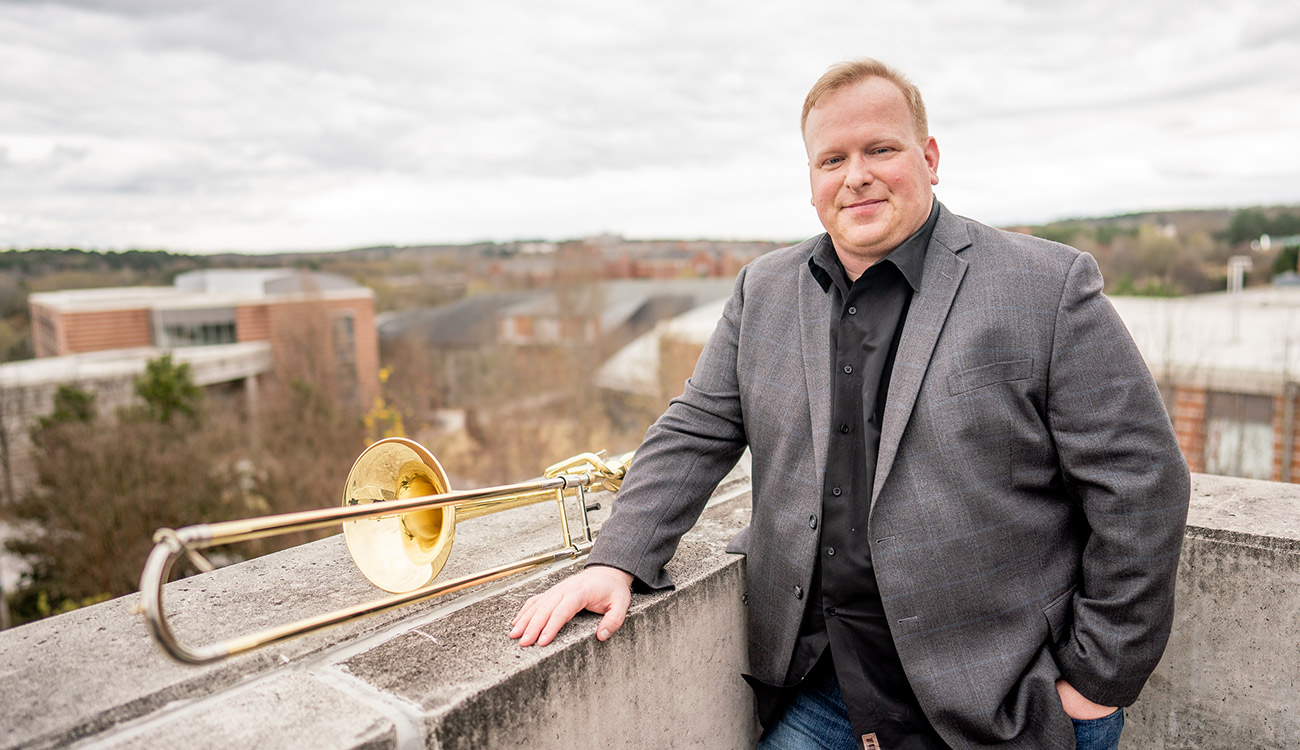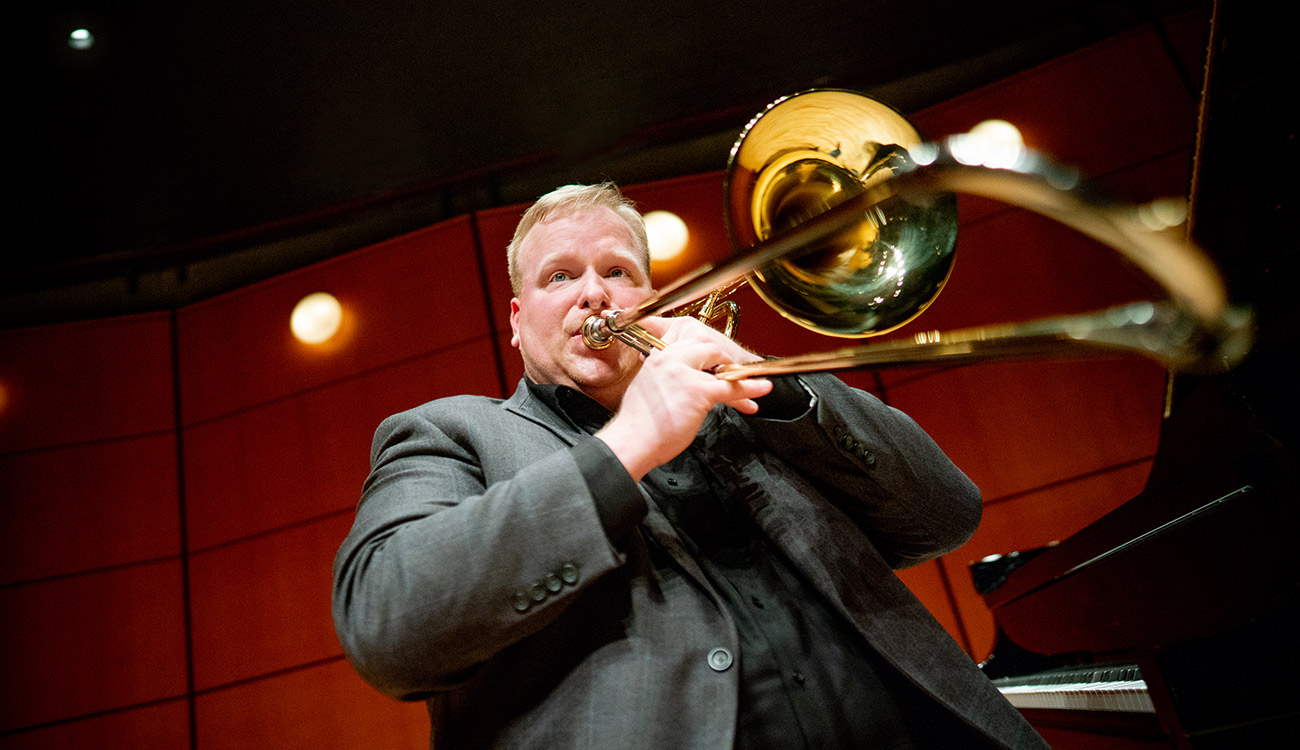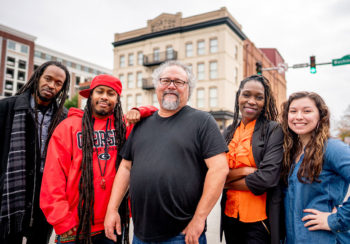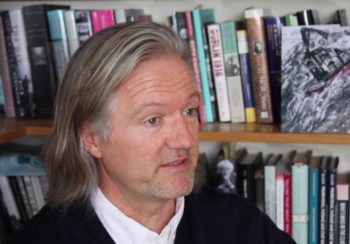In this video, Josh Bynum plays a mashup of Henry Mancini’s “Moon River” and Claud Debussy’s “Clair de Lune” with fellow Hugh Hodgson School of Music faculty member Anatoly Sheludyakov. The two musicians also collaborated on Bynum’s 2015 album Catalyst, a collection of musical pieces that were inspired by other works of art, such as the poetry of Emily Dickinson, the short stories of Edgar Allan Poe and the paintings of Francisco de Goya.
Talk about your album Catalyst and the inspiration behind it.
It’s a collection of preexisting works that were all inspired themselves by something else. We have a relatively undiscovered repertoire of solo literature, and I felt it was important to shine a light on pieces that might not be getting played as much they should be. Quite honestly, the reason some pieces don’t get played is because people don’t know they’re out there. The thread I used to tie them all together was this idea of inspiration, that something serves as a model of inspiration to create something new.
I thought it would be great to record all of these and have them as a resource in one place so students could be drawn to them. For musicians, listening is a form of inspiring us to want to play something. Listening to other musicians helped me define my tastes and shape how I wanted to sound on the instrument. It’s all geared towards inspiring or inspiration. And, of course, I was also inspired by my amazing, world-class pianist on the album, Anatoly Sheludyakov, who’s on faculty here and is one of the true gems of this university.
Let’s talk about the intersection of music and research. For many fine arts faculty, performance is their research. What does that intersection mean to you, between musical performance and the discovery of new knowledge or new ways of thinking?
First, I want to be clear that I’m not setting this up as some kind of “us versus them” mentality, but this is a discipline of doers. The comedian-musician Martin Mull said, “Writing about music is like dancing about architecture.” There’s a point to it, of course, but without the execution, without the performance, it’s missing something. It’s a discipline that requires performance.
The intersection of research and performance, to me, is figuring out how I cannot just wash, rinse and repeat something that’s already been done a million times. That’s definitely a form of research, because as the performer, you have some interaction with the composer on what you want to see brought about in our repertoire.
I’ll give you an example: Ferdinand David’s “Concertino.” That’s a very standard piece. The world does not need a 25th recording of that piece. The world needs us to find new pieces to shine the light on, or commission people to write, and advance the cause of the instrument into the public discourse so they begin to see the real beauty of the instrument.
I come back to this idea that music is not rhetorical—it’s practical and so necessary. This past year, people have begun to see that when you take live music out of the equation, you begin to see how precious it is, the connections it builds. With recorded music versus live music, there’s such a difference. It’s a different experience. It’s a human experience, and our role is to provide that. That’s our research.

Bynum’s faculty position allows him to move between the classroom and the concert hall, and he regularly performs with the Atlanta Symphony Orchestra. “I love playing orchestral music,” he says. “There is nothing like it. There’s so much adrenaline, and you see this amazing music being created around you and you have an opportunity to be part of it and join in.”
There are many career paths for musicians to take. What brought you to UGA?
I consider myself a performer who has the great fortune of being at the University of Georgia teaching. When I started my music education degree, I wanted to be a high school or middle school band director. But the more advanced I became on my instrument, the more I really loved my instrument, I started thinking that I wanted the focus to be on my own musical growth. So that starts to narrow the scope: “OK, I want to focus on me, but also help others who play my instrument.”
There are so many creative outlets housed in this position, whether it be a chance to work with someone like Anatoly and have solo recitals and recital tours, or wonderful chamber music with my amazing colleagues, or working with the composition faculty to bring about really interesting and new pieces. I also have the good fortune to play regularly with the Atlanta Symphony Orchestra, which scratches that itch for me because I love playing orchestral music.
There is nothing like it. There’s so much adrenaline, and you see this amazing music being created around you and then you have an opportunity to be a part of it and join in. The feeling of a great performance, it’s euphoric. Absolutely. And then the discipline to say, “OK, we’re going to come back here tomorrow night and we’re going to do it again, and we’re going to make it even better.” Seeing that happen at the highest level is so inspiring, and when you have a chance to actually be a part of that experience, it makes the 10,000 hours so worth it. You’ll be willing to give 10,000 more.
To see more of Josh Bynum’s performances, visit his YouTube channel.






